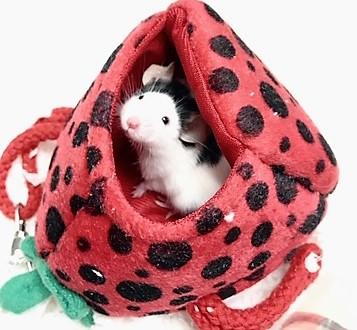
Care of the Pet Rat & Mouse
Domesticated rats and mice can be low-maintenance, inexpensive, and entertaining pets. Rats are clean, friendly, and enjoy socializing with their owners. Mice are playful as well and prefer to be with other mice for socialization. Through selective breeding, there are many different color and coat patterns to choose from for rats and mice. On average, rats live 2-3 years and mice live 1-2 years. Rodents are mainly nocturnal, becoming more active in the evenings and during the night. So choose your cage location wisely!
A rodent ration containing 12-16% protein and 4-6% fat, either in pellet or block form, is recommended for pet both species. Supplement the diet with small amounts of freshly washed, nutrient-dense fresh fruits such as berries, bananas, papaya, apricot, and raw vegetables such as peas, sweet potato, broccoli, corn-on-the-cob, and dark, leafy greens. Mice love dandelion leaves too!
Seed-based diets as well as vegetable-based protein (lentils) can be offered as occasional treats. Overfeeding of these foods will predispose the pet to obesity and nutritional deficiencies. Avoid cheese as it is high in fat and rodents cannot tolerate large amounts of lactose.
Provide the largest case possible for your pet rodent. They are notorious chewers, so cages of stainless steel, durable plastic, or wire are recommended. The bottom of the cage should have a solid, plastic base as to not cause sores on the bottoms of the feet. The top of the cage should have closely spaced metal bars that are great for containment but also allow air flow and ventilation.
The substrate within the cage should be soft and deep, allowing for burrowing, resting, and to soak up urine. Select absorbent, non-toxic, and odor free bedding. Recycled paper products or aspen shavings make the best lining materials. The following beddings should be avoided due to toxicity and/or irritation: cedar shavings, corncob bedding, sawdust or pine shavings.
Provide tunnels, exercise wheels, and next boxes to help maintain physical and mental activity. Provide cardboard tube rolls, wooden blocks, etc. as chew toys.
The optimal temperature range is 65-78*F, with a relative humidity of 40-70%. Keep the cage out of direct sunlight and away from heat sources or drafts.
Clean the cage and all cage furniture once or twice weekly. Changing the bedding and cleaning food/water dishes at that time.

